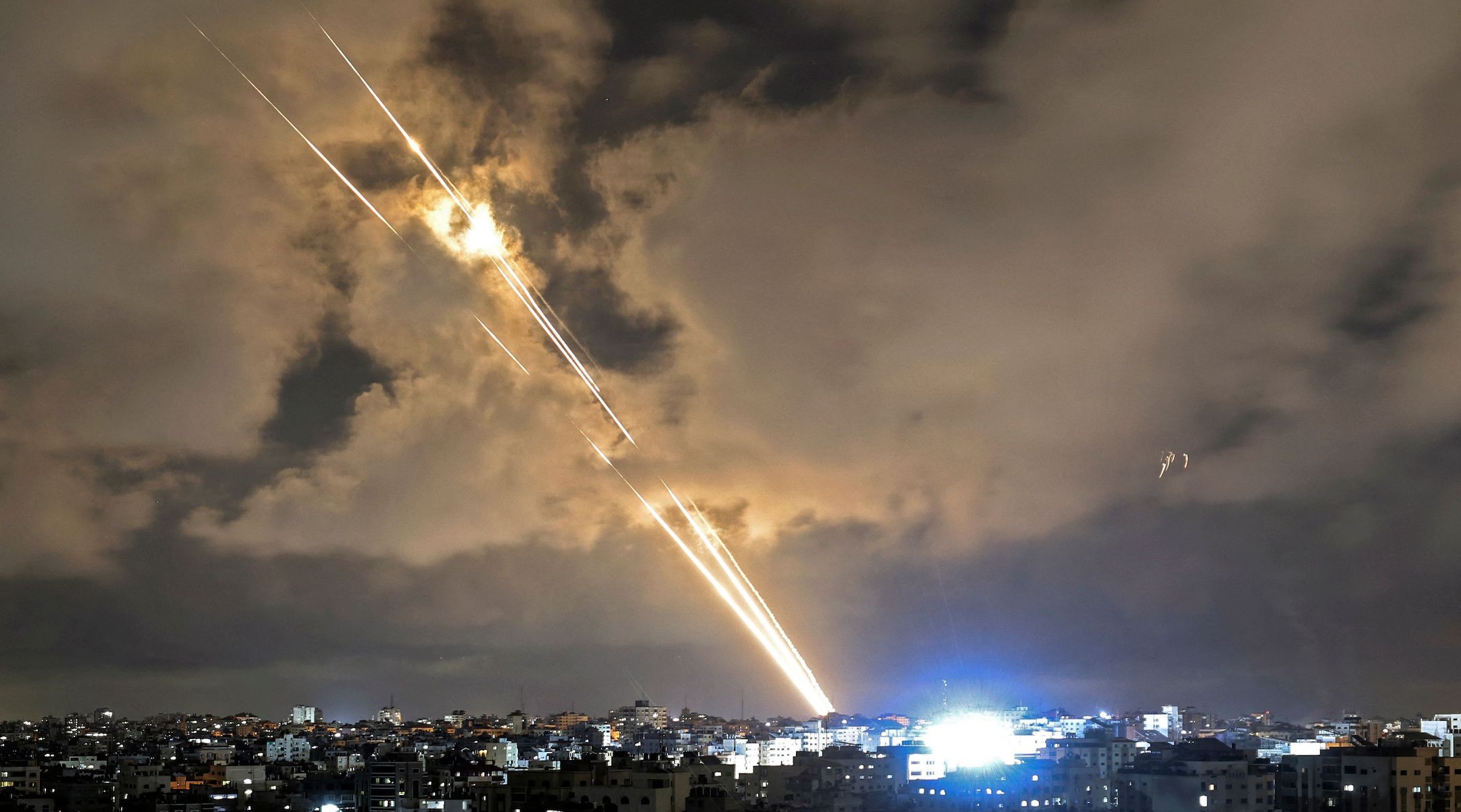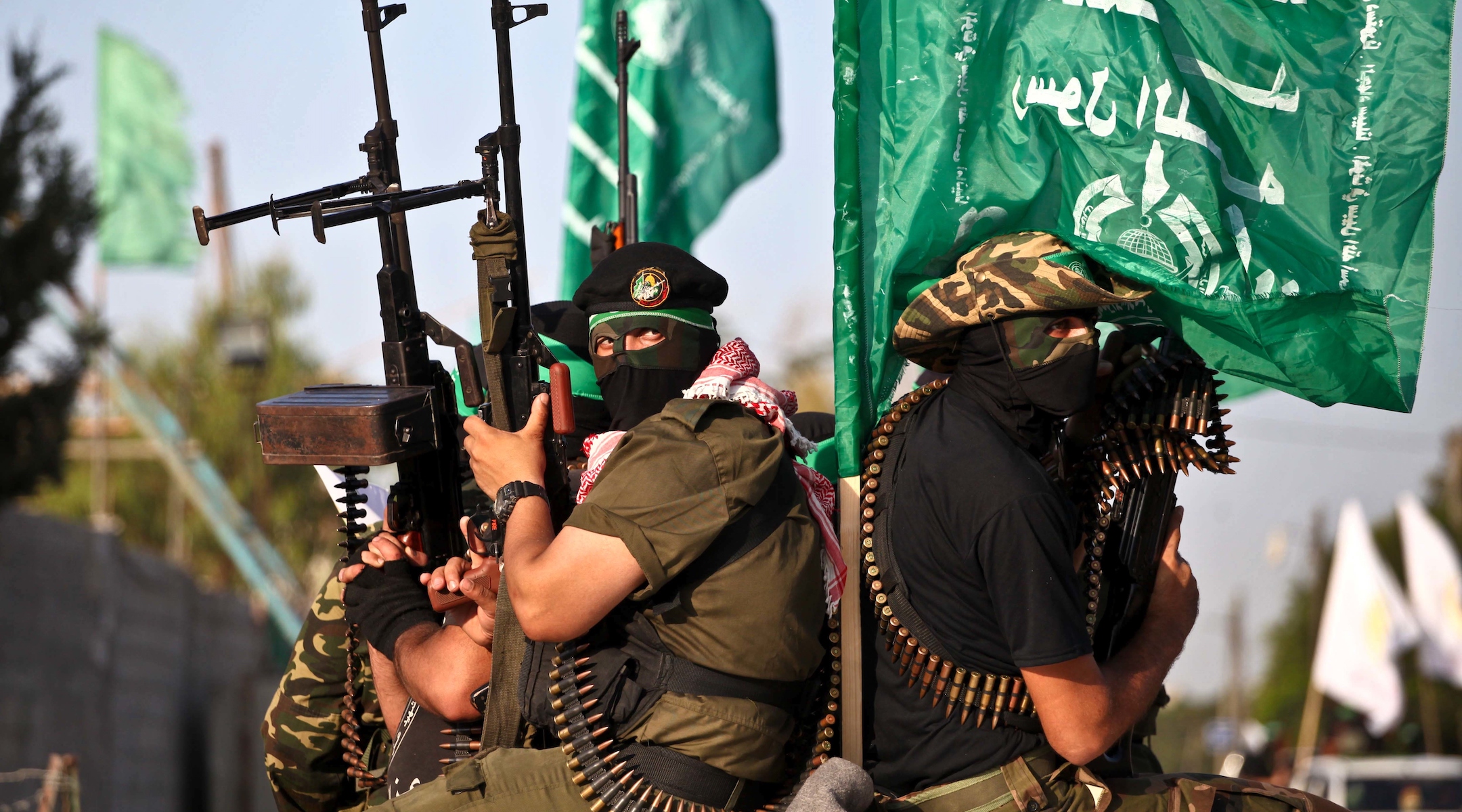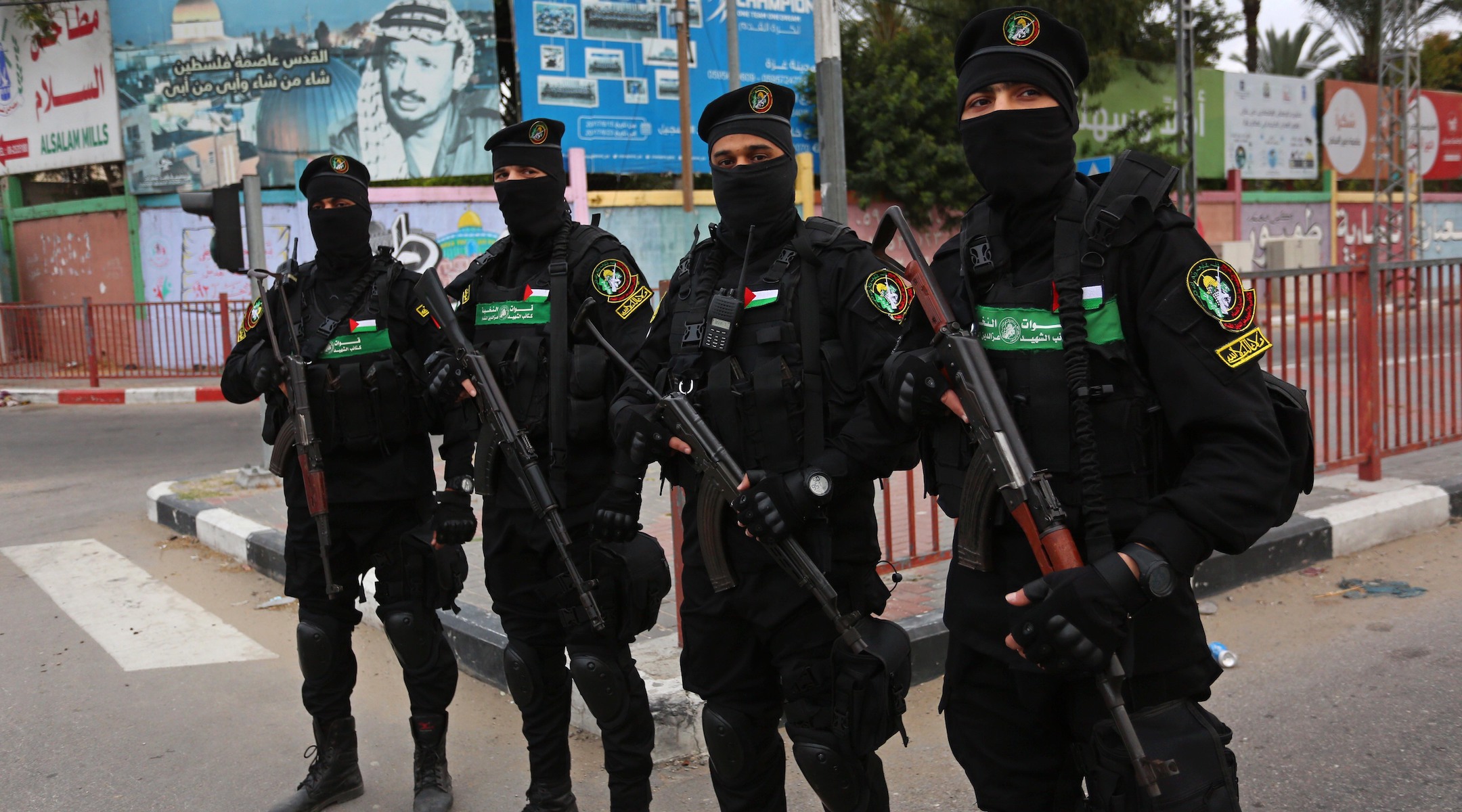(JTA) — Israel just ended an 11-day military campaign in Gaza. Who was it fighting?
The conflict, which began last week and is ending with a ceasefire overnight on Thursday, wasn’t exactly between Israel and another country. Rather, for the fourth time since 2008, Israel was engaged in a fierce battle with Hamas, the militant Islamist terror group that controls the Gaza Strip.
Is Hamas an army? A government? A terrorist organization? The answer is: all of the above. For more than three decades, Hamas has fought, quixotically, to destroy Israel, first through suicide bombings and later through barrages of missiles from Gaza, which Hamas has ruled for more than a decade. In recent years, it has hinted at being open to a long-term truce with Israel, which (obviously) hasn’t happened yet.
Here’s what you need to know about Hamas.
Hamas is an Islamist terror group that has become a de-facto government.
Hamas, an Arabic acronym for Islamic Resistance Movement, was founded in 1987, at the start of the first Palestinian intifada, or uprising against Israel. The intifada was a grassroots-led uprising, and at the time, the leading organized Palestinian movement, the Palestine Liberation Organization, was secular.
Hamas was founded as a religious Muslim alternative. It is an offshoot of Egypt’s Muslim Brotherhood, an Islamist organization, in Palestinian society. Like the PLO did, Hamas carried out violent attacks against Israel. But unlike the PLO, it sought to establish a theocratic Muslim Palestinian state in what is now Israel, the West Bank and Gaza. After its founding, Hamas established a network of charities and social services in Palestinian cities, which attracted followers.
When the PLO signed a peace accord with Israel in 1993, Hamas rejected the agreement, and pledged to continue its attacks on Israel. Over the next few years, Hamas committed a series of terror attacks within Israel, bombing buses, malls and other targets.
Four Hamas attacks over the span of 10 days in 1996 are thought to have swung that year’s Israeli election to Benjamin Netanyahu, who had promised to slow the Israeli-Palestinian peace process. During the second intifada in the early 2000s, Hamas carried out some of the deadliest suicide bombings, including attacks at a Tel Aviv club and a crowded hotel on Passover.
In 2005, Israel withdrew its settlers and troops from the Gaza Strip, which Israel had conquered from Egypt in 1967. Israel ceded control of Gaza to the Palestinian Authority, a provisional Palestinian government. But the next year, Hamas won Palestinian legislative elections.
In 2007, it violently ousted the rival Palestinian Fatah party from Gaza and took full control in an effective military coup. Since then, Hamas has run a de-facto authoritarian government in Gaza, while Fatah runs Palestinian areas of the West Bank. There have not been Palestinian national elections for more than a decade.

Rockets are launched towards Israel from Gaza City on May 20, 2021. (Mahmud Hams/AFP via Getty Images)
Hamas’ stated goal is to destroy Israel — though it also negotiates with Israel.
For almost three decades, Palestinians and Israelis have been negotiating, intermittently, for peace. But not Hamas.
In its 1988 charter, Hamas vows to destroy Israel, to “raise the banner of Allah over every inch of Palestine” and to defeat the “Zionist invaders.” It declares that “peaceful solutions and international conferences are in contradiction to” its principles. The charter is rife with antisemitic statements about Zionists controlling global wars, finance and media, and it looks forward to a day when Muslims kill the Jews.
Hamas has acted on that ideology through suicide bombings, kidnapping and, in recent years, missile attacks on Israel. But there is pressure for change. As Hamas has governed a territory whose borders are controlled largely by Israel, it and the Jewish state have had to engage with each other indirectly. Following bouts of fighting, the two sides now reach ceasefires through indirect negotiations and Israel transfers money to Hamas to fund its government.
In 2017, Hamas released a new statement of principles that may have been intended to create an opening for a way to exist alongside Israel. While the document still disavows previous Israeli-Palestinian agreements and “rejects any alternative to the full and complete liberation of Palestine, from the river to the sea,” it also says that the creation of a Palestinian state in the West Bank and Gaza is a “formula of national consensus.”
The 2017 document also seeks to distance Hamas from the antisemitism of the 1988 charter. It says, “Hamas does not wage a struggle against the Jews because they are Jewish,” but rather fights “the Zionists who occupy Palestine.”

A member of the military wing of Hamas holds his weapon during a march in Gaza City on Sept. 14, 2013. (Majdi Fathi/NurPhoto)
Hamas has fired missiles at Israeli cities for two decades and fought repeated wars with Israel.
Since 2001, Hamas has used Gaza to fire rockets at Israeli cities. Smaller Palestinian groups, such as Islamic Jihad, also fire rockets at Israel from Gaza.
When Hamas took control of Gaza in 2007, it increased its rocket fire. When Hamas refused to disavow violence and recognize the Israeli-Palestinian peace accords, Israel did not recognize its government in Gaza, and launched a blockade of Gaza that has continued for 14 years, during which humanitarian goods like food and medication are allowed in.
Israel has repeatedly fought with Hamas due to the rocket fire, fighting major bouts of conflict in 2008-09, 2012, 2014 and this month. The 2014 conflict, known as the Gaza War, was particularly long and intense, and it included an Israeli ground invasion of Gaza. In that conflict, more than 2,100 Palestinians and 70 Israelis were killed. More than 200 Palestinians and 12 Israelis have been killed in the current conflict. Israeli casualties are low in part because of Israel’s missile defense system, the Iron Dome, which intercepts Hamas rockets.
The international community, including Israel, has long condemned Hamas for firing rockets indiscriminately at Israeli civilian populations. In defense of its bombing of densely populated areas of Gaza, and the high casualty counts that follow, Israel accuses Hamas of purposefully firing its rockets from crowded civilian areas, at Israeli civilians — something Israel calls a “double war crime.”
A United Nations report following the 2014 Gaza War gave some credence to Israel’s allegations. The report, which also accuses Israel of violating international law, said that Hamas regularly fired from civilian areas and that “it does not appear that this behaviour was simply a consequence of the normal course of military operations,” which would constitute a violation of international law.
Hamas competes with the secular Fatah party for power among Palestinians.
While Hamas’ conflict with Israel gets the most attention, it also has another fierce rivalry — with Fatah, the comparatively moderate, secular party that negotiates with Israel and partially governs Palestinian areas of the West Bank. Fatah is affiliated with the PLO, which negotiated the 1993 peace accord with Israel.
Since 2007, when Hamas and Fatah violently clashed in the West Bank, the two sides have made abortive attempts at creating a unity government that would jointly govern in the West Bank and Gaza. That has not happened yet, and the two parties still compete for influence and power.
For more than a decade, and most recently last month, Palestinian President Mahmoud Abbas, of Fatah, has delayed successive Palestinian elections in part due to a fear that Hamas could win. In a recent survey of Palestinians, taken before the fighting, 43% said they would vote for Fatah and 30% for Hamas. In Gaza, the poll found that Hamas was slightly more popular than Fatah.
For now, Hamas retains full control of Gaza, where it runs a dictatorial government with few civil rights.
Freedom House, which measures how free countries are worldwide, says that Hamas runs a “de facto one-party state” without a free press and with a “repressive environment,” particularly for people who are LGBTQ. The group said that Hamas’ government, combined with Israeli and Egyptian control of Gaza’s borders, meant that the “political rights and civil liberties of Gaza Strip residents are severely constrained.”
JTA has documented Jewish history in real-time for over a century. Keep our journalism strong by joining us in supporting independent, award-winning reporting.






